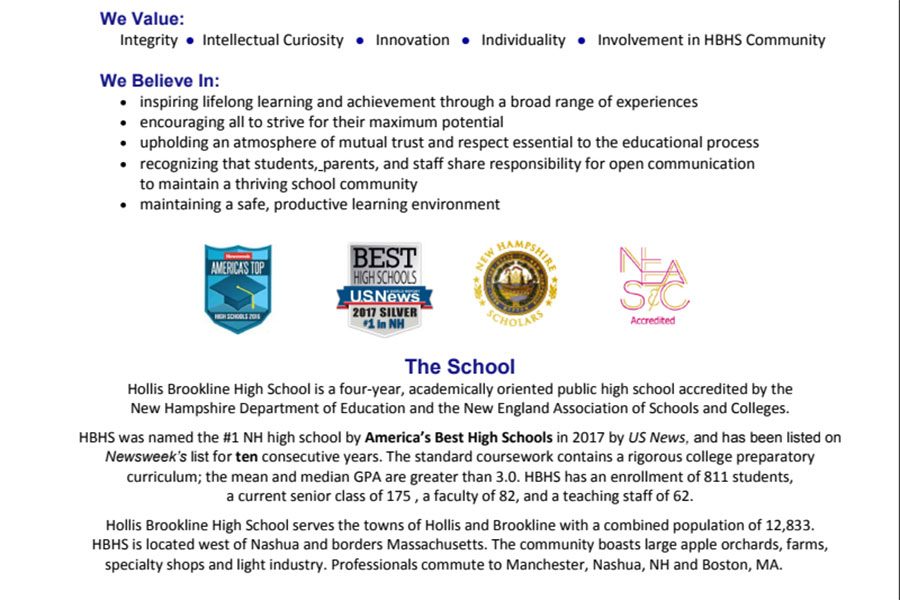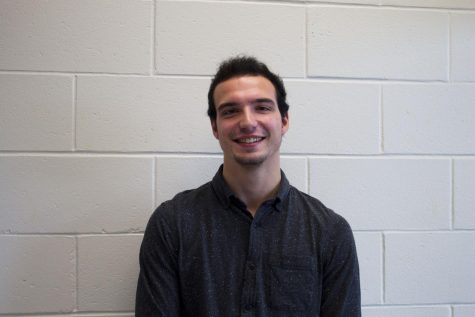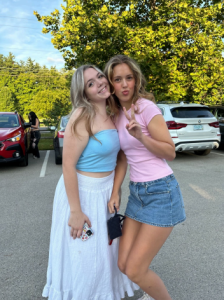A shift in education: independent learning
Considering the benefits of Honors-by-Contract
Hollis Brookline’s Profile displays some of the school’s academic rigor and overall success. SAU41 is known for typically leading the public educational scene in New Hampshire, consistently ranking within the top three schools year after year. “I believe school is what you make of it and those who chose to go further and dig deeper should be given the credit they deserve,” says Madeleine McCann ‘18, in regard to enabling students to embark on independent projects.
November 20, 2017
It isn’t rare to read clickbait headlines when it comes to educational reform, whether it be a new technology, a new program, or changing school start times. Through all the noise, one of the few shifts taking place that deserves special attention is the idea of independent, student-led learning. Over the past few years at Hollis Brookline, the school curriculum has started to shift more towards this idea, with additions such as Senior Quest–producing completely student run projects–and the quick growing option of “honors-by-contract” classes. While student-led learning has started to pick up steam, the following questions remain: is it here to stay, and, if so, will more students be able to take advantage of the option?
The short answer is yes and no.
Let’s begin with a class receiving a lot of attention over the last few months: Senior Quest. In summary, the class gives students the chance to be in the driver’s seat of their own education, being pushed forward by nothing but their own intellectual curiosity. This enables them to research, write, and execute what is effectively their own year long curriculum in order to answer their personally crafted goal or question. The class is shaped by loose requirements such as weekly work logs, certain assignment requirements, and application of those assignments to Hollis Brookline’s four C’s: Critical Thinking, Creativity, Communication, and Collaboration. A “safety net,” if you will, is created by meeting with the school’s librarian, Christine Heaton, who helps each student lay out a plan for their project, generate network connections, and locate helpful resources within the library and far beyond. One of the most apparent issues with this class would be expanding it to more than the twelve students currently enrolled in the course.
This is where another student-led educational model, the “honors-by-contract” option, comes in. This option, currently allowed in less than a handful of classes, gives students the ability to pursue honors-level work in a college preparatory class. The social studies department has led the charge by offering it in both Civics and Economics, allowing students to create their own interdisciplinary, semester-long projects to pair together a personal passion to the given subject of study. “The idea with an honors-by-contract course is that you are accepting higher standards for learning the subject, but you’re doing so on your own,” says Social Studies Teacher, Katherine Henderson. She went on to say that honors usually encompasses about 20% extra work than the standard course, without extra content. She explained that the independent project allowed more for the application of what the student is learning in class, rather than longer homework assignments or longer tests.
However, this is a model that might not lend itself well to all courses. “I think there are certain classes that have a level system that works (ex. Physics or AP Physics), meaning those classes wouldn’t need the option, however classes such as…sociology, could be an option,” says Madeleine McCann ‘18, “Classes that are described more as electives would be the ideal place to offer this option, as it will allow students to dig deeper when the curriculum may not satisfy that curiosity.”
When looking at the possibility of implementing this option in more classes, an important aspect to consider is the school work-health lifestyle balance for students. Is it time to start addressing the sheer number of weighted classes students should be allowed to take?
That’s a difficult question to answer, and one that would have to be discussed thoroughly, but a possible solution might be to cap the number of weighted classes a student can take at a time, enabling them to only pick the classes they are truly interested in, rather than taking as many weighted classes as possible to help boost their GPAs. In response to this tactic of student’s going to the end of the earth to increase their GPA rather than pursuing true interests, several schools have already implemented the weighted class cap, including neighboring Milford.














